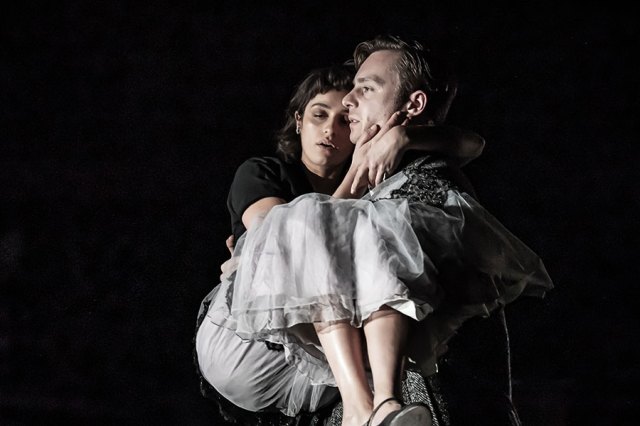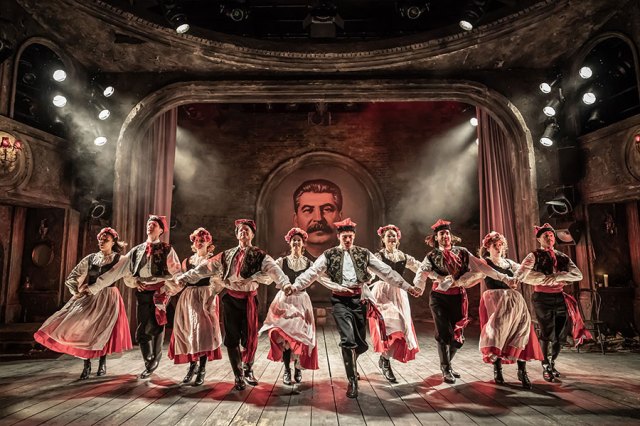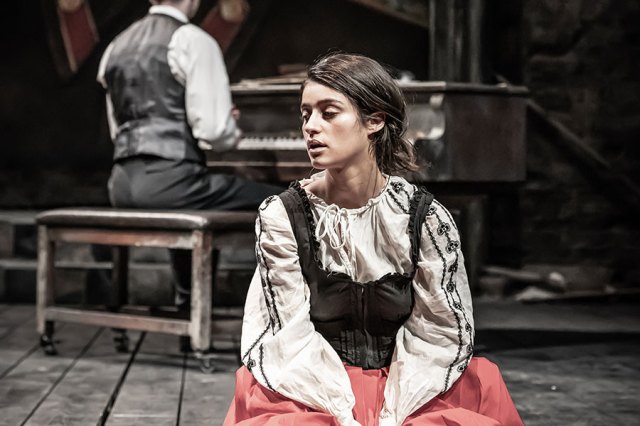Cold War at the Almeida Theatre – review
Conor McPherson’s new piece is directed by Rupert Goold

In a cold church hall, a group of shivering villagers in too-thin clothes are gathered together to sing the folk songs of their region. A mournful plaint about suffering is rudely interrupted by a brash, bouncy man, wrapped in a mustard coat. “Too crude, too crude,” he breezes. “That’s the mountain style.”
The Almeida is a tiny theatre in north London but more than any other venue it has the ability to transport you to different places. In Jon Bausor’s evocative design of brick arches and slab floors, and in Rupert Goold’s exceptional fluid direction, an entire world is conjured. You feel the cold, sense the texture of the clothes (wonderful design by Evie Gurney) and the hunger. You know you are in Cold War Poland where traditional music is being gathered to build a folk ensemble performing “the music of victory” featuring the “cream of our young talent.”

A sense of time and place is vitally important to Conor McPherson’s clever adaptation of Pawel Pawlikowski’s Oscar-nominated film. The doomed love story between composer Wiktor (Luke Thallon) and the defiant performer Zula (Anya Chalotra) who sees her place in the folk ensemble as a way out of a miserable, violent existence, is shaped and distorted by the circumstances of their lives. Later, he chooses to defect and she to remain, but neither can either survive with or without the other, and with or without their homeland.
All this is wonderfully conjured by the production, punctuated by songs by Elvis Costello, which sweeps from the red-costumed stomps and swirls of the traditionally-costumed dances in the first act (all bright red skirts and floral headdresses) to khaki-clothed songs for Stalin, to the Paris of the 1960s with Jean Luc-Godard’s Madison routine and wild rock ‘n’ roll, and back to the seedy clubs of Soviet-ruled Poland, where the gold dress Zula wears looks just a bit tackier than its Parisian equivalent.
The choreography by Ellen Kane is superb, and the music, with songs often repeated in different styles and different settings, is gloriously melancholic, filling the smoky air (superbly lit by Paule Constable) with an almost tangible sense of pain and half-concealed emotion. “Songs about love and devils” is how Wiktor characterises the melodies he is collecting – and both heaven and hell, the agonies of love and the contrasting tugs of home and freedom are all on display here.

Goold’s direction is extraordinarily sensitive and supple; scenes seem to morph into one another rather than simply arriving. The themes emerge in a similar way. The play sees music is both as an escape and a tool, always capable of being perverted by a regime that sees a reshaped tradition as a means of building a glorious future, but equally always a force for true expression.
A 90-minute film has become a 2 hour and 40 minute show, and arguably the action – particularly in the second act – loses some momentum. But it is powered by utterly engrossing performances, first and foremost from an ensemble that sing and dance with passion and sweet harmony. As Wiktor, a man with secrets and a terrible sense of his own lack of worth, Thallon seems to button himself up in front of your eyes. He is all suppressed feeling and terrible regret, his arms constantly folded across himself, his terrible yearning tamped down.
In contrast, Chalotra seems to feel too much, chasing away her unhappiness with a desperate lust for life, for movement, for the songs that she produces in the purest of voices, until time and circumstance wear her down to a husk of her former self. Between them, Elliot Levey as the born-survivor impresario Kaczmarek, bounces like an irrepressible force, constantly wary, always with an eye to the main chance, but with an essential humanity peeping through.
It’s an unusual and original show, one that haunts you long after you leave the theatre, its essential sadness sweetened by tinges of hope and a deep humanity.
















